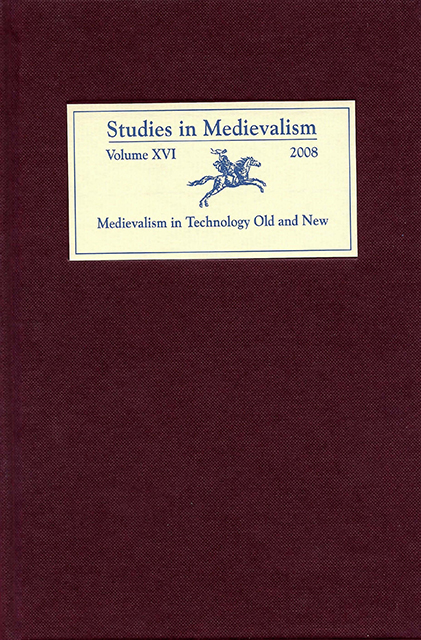Book contents
- Frontmatter
- Studies in Medievalism
- Acknowledgments
- Contents
- Volume XVI 2008
- Illustrations
- Editorial Note
- Contes du Style des Troubadours: The Memory of the Medieval in Seventeenth-Century French Fairy Tales
- A Ritual Failure: The Eglinton Tournament, the Victorian Medieval Revival, and Victorian Ritual Culture
- An Eastern Medieval Revival: Byzantine Art and Nineteenth-Century French Painting
- I Am Weary of That Foolish Tale: Yeatss Revision of Tennysons Idylls and Ideals in Time and the Witch Vivien
- The Doughboy Comes to Chartres: Stars and Stripes and the Middle Ages
- Constructing Difference: The Guidonian Hand and the Musical Space of Historical Others
- An Introduction to Medievalist Video Games
- Medieval and Pseudo-Medieval Elements in Computer Role-Playing Games: Use and Interactivity
- Romancing the Game: Magic, Writing, and the Feminine in Neverwinter Nights
- Revising the Future: The Medieval Self and the Sovereign Ethics of Empire in Star Wars: Knights of the Old Republic
- Promises of Monsters: The Rethinking of Gender in MMORPGs
- Contributors
Promises of Monsters: The Rethinking of Gender in MMORPGs
Published online by Cambridge University Press: 10 March 2023
- Frontmatter
- Studies in Medievalism
- Acknowledgments
- Contents
- Volume XVI 2008
- Illustrations
- Editorial Note
- Contes du Style des Troubadours: The Memory of the Medieval in Seventeenth-Century French Fairy Tales
- A Ritual Failure: The Eglinton Tournament, the Victorian Medieval Revival, and Victorian Ritual Culture
- An Eastern Medieval Revival: Byzantine Art and Nineteenth-Century French Painting
- I Am Weary of That Foolish Tale: Yeatss Revision of Tennysons Idylls and Ideals in Time and the Witch Vivien
- The Doughboy Comes to Chartres: Stars and Stripes and the Middle Ages
- Constructing Difference: The Guidonian Hand and the Musical Space of Historical Others
- An Introduction to Medievalist Video Games
- Medieval and Pseudo-Medieval Elements in Computer Role-Playing Games: Use and Interactivity
- Romancing the Game: Magic, Writing, and the Feminine in Neverwinter Nights
- Revising the Future: The Medieval Self and the Sovereign Ethics of Empire in Star Wars: Knights of the Old Republic
- Promises of Monsters: The Rethinking of Gender in MMORPGs
- Contributors
Summary
Consider gender, for instance, as a corporeal style, an “act” as it were, which is both intentional and performative, where “performative” itself carries a double meaning of “dramatic” and “nonreferential.”
Yes, it's just a game, the way that the real world is a game.
It is a commonplace to assert that one of medievalism's greatest virtues lies in its opportunities for the loosening of gender constrictions, and certainly a quick inventory of medievalist texts from the 1980s on seems to bear witness to this phenomenon, as it features females taking up traditionally male roles, alternative matriarchal societies, and the sharp questioning of traditional masculine values. Yet while these may be refreshing changes from the pale and overtressed maidens of Pre-Raphaelite painting or the vapor-prone women of Gothic novels, celebration of this phenomenon needs to be tempered with caution. Jane Tolmie's intelligent essay on heroines in the fantasy genre, for example, shrewdly points out that like their forerunners in medieval romance, fantasy heroines’ very exceptionalism depends, within the constraints of the genre, upon the flattening of representation and upon lack of power for the other female characters. Moreover, the heroine's access to power is frequently through the very cultural institutions that support constraining ideologies of gender in the first place. Other critics, such as James Noble and Lee Tolbin McClain, have focused attention on the problematic gender essentialism and homophobia in The Mists of Avalon, or found that overly narrow emphasis on behavioral gender roles in medievalist texts ignores the issue of determinative embodiment of these heroines: where, for example, is the place in medievalism for the “gap-tothed” Wife of Bath or Grendel's grieving mother? However, most studies of the relationship of gender and medievalism have focused on traditional texts: novels, short stories, films, and, occasionally, graphic novels. Massively multi-player online role-playing games (known as MMORPGs), of which the dominant games are largely medievalist, complicate the idea of a medievalist “text” on a number of grounds. First, they are capable of near-infinite expansion of both narrative geography and characters; in fact, their survival depends upon continual growth in both areas. Second, they are collaborative texts formed from the templates given by the programmers and from the adventures and contextual narratives provided by the participants.
- Type
- Chapter
- Information
- Studies in Medievalism XVIMedievalism in Technology Old and New, pp. 184 - 204Publisher: Boydell & BrewerPrint publication year: 2008

